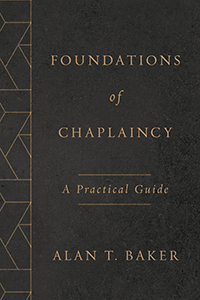Alan Baker highlights the importance of self-care for pastoral care providers to keep their personal buckets filled so that they are not emptied by burnout and compassion fatigue. He offers ways for church leaders and chaplains to enhance their practice of self-care and build resilience.
Your personal health is an important aspect of self-care. Christian chaplains strive to sustain healthy habits because God created the body for his own purpose: “Do you not know that your body is a temple of the Holy Spirit within you, whom you have from God? You are not your own” (1 Cor. 6:19). Basic building blocks for one’s body include getting adequate sleep, getting regular physical exercise, eating a well-balanced diet, maintaining significant relationships, having an active prayer and devotional life, and sustaining connection with one’s ecclesiastical body.
Burnout and compassion fatigue empty your bucket.
How do you keep your bucket full of energy and compassion? Perhaps you start your day by pouring energy and compassion out of your bucket after encountering and addressing an injustice. You still have a half bucket after meeting with a grieving family at noon. Yet the afternoon consumes the rest of your energy as you work on next year’s budget. Your bucket of empathy and energy is now empty, and you still have a small-group meeting at night. Burnout is a common reaction to long-term stresses such as professional isolation, ambiguous successes (e.g.,”That was a great sermon, but the twenty hours you spent preparing didn’t count”), an unrealistic and unsustainable pace, undefined boundaries, and a messiah complex believing you need to save the world.
Burnout makes you feel apathetic, pessimistic, indifferent, irritable, and negative. These are typical symptoms of compassion fatigue frequently experienced by caregivers. You are not tired of being compassionate but tired from being compassionate. Chaplains and other caregivers become emotionally depleted after hearing about pain suffered by victims. The emotional and physical distress caused by serving those deeply in need can desensitize a chaplain’s ability to express empathy. This may result in no longer having the emotional energy to be “present.”
You also may encounter secondary trauma by exposure to people who have been traumatized themselves. Their disturbing description of traumatic events raises your level of compassion fatigue because your empathy collides with your inability to solve or cure the issue. Prolonged burnout and compassion fatigue result in stress-related diseases, like high blood pressure, as well as moral ambiguity if what you hold as sacred has been violated. Your perspective changes. You may experience doubt and uncertainty regarding your calling, your ministry value, and your faith.
Fill your bucket.
Fill your empty bucket through intentional self-care. Experience an annual retreat with your denomination. Go away for spiritual direction and guidance. Encounter a silent retreat. As you practice care for the caregiver, you develop resiliency. Your ministry of compassion and caring comes from the full bucket of God’s compassion for you and his caring of your life. You can only give what you’ve received. This is a wonderful, grace-filled gift.
All your natural abilities of inspiring, influencing, relationship building, and strategic thinking can go only so far unless you build resilience. How can you develop the capacity to recover quickly from difficulties? A number of resources are available to help chaplains sustain a forward-looking and uplifting presence.[1] Remember that you are called, not just driven: “Driven people often project a bravado of confidence as they forge ahead with their achievement-oriented life plan. … Called people, on the other hand, possess strength from within, a quality of perseverance and power that are impervious to the blows from without.”[2] May God use you as a person responding to what he is calling you to do, and may you do it in a way that gives you satisfaction — soul-expanding, bucket-filling life. Survival skills for healthy chaplains include:
- Setting appropriate boundaries
- Learning to delegate
- Maintaining a personal support system
- Learning the power of saying no
- Personal prayer, meditation, and worship
1 Ken Sampson, Resiliency: 31 Ways to Build Spiritual Resilience (Harlan, IA: Guideposts Outreach Publications, 2011).
2 Gordon MacDonald, Ordering Your Private World (Nashville: Nelson, 2003) 45.
 This article is adapted from Foundations of Chaplaincy (William B. Eerdmans Publishing Company, 2021) by Alan T. Baker. This book is available at William B. Eerdmans, Cokesbury, and Amazon.
This article is adapted from Foundations of Chaplaincy (William B. Eerdmans Publishing Company, 2021) by Alan T. Baker. This book is available at William B. Eerdmans, Cokesbury, and Amazon.
Related Resources
- “Leadership Includes Self Care” by Eric Hernandez, a Leading Voices video
- Getting Beyond Ministry Burnout and Tiredness by Jaye Johnson
- 4 Practices to Help Prevent Clergy Burnout by Matt Bloom and Kim Bloom
Cover image by Jill Wellington from Pixabay






